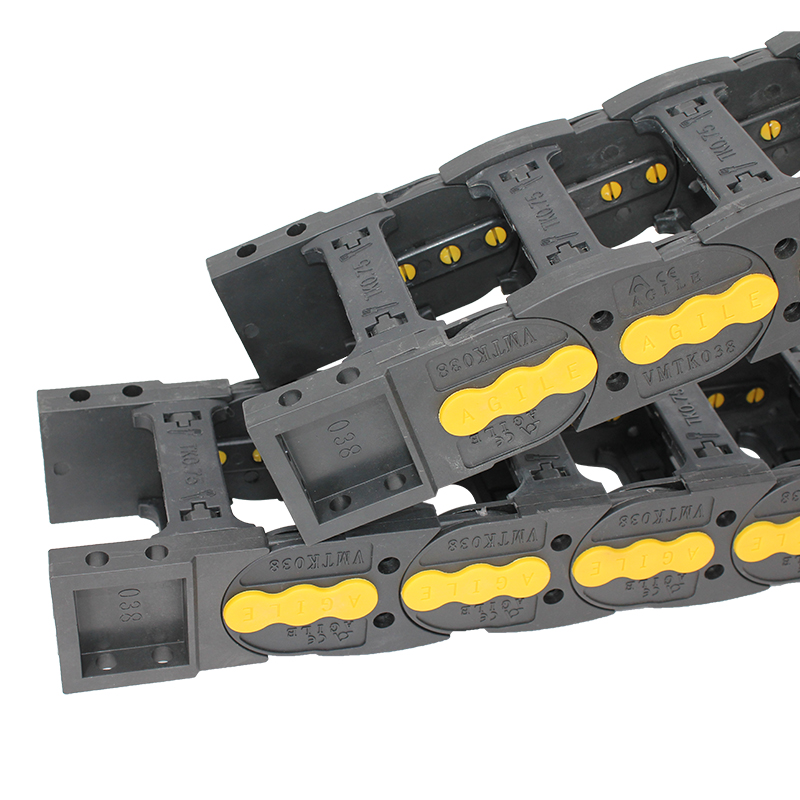Innovative Solutions for Electrical Cable Management and Transportation Systems
Understanding Electrical Cable Carriers An Essential Component for Efficient Cable Management
Electrical cable carriers, also known as cable tracks or drag chains, are essential components in modern industrial equipment and machinery. They serve a practical purpose to guide and protect cables and hoses while allowing for free movement and flexibility in various applications. As industries continue to evolve and demand higher performance and efficiency, the importance of electrical cable carriers has grown significantly.
What are Electrical Cable Carriers?
Electrical cable carriers are flexible conduit systems designed to support and protect a variety of cables and hoses. Typically made from durable materials such as nylon, steel, or aluminum, these carriers ensure that electrical cables remain organized, secure, and accessible throughout their operational lifespan. Their design allows for easy installation and maintenance while reducing wear and tear on cables, which can lead to costly downtime and repairs.
Key Features of Electrical Cable Carriers
1. Durability Cable carriers are designed to withstand harsh industrial environments, including exposure to chemicals, extreme temperatures, and physical stresses. This durability prolongs the life of the cables they protect.
2. Flexibility One of the primary advantages of cable carriers is their flexibility. They can be configured in various shapes and lengths to accommodate different machines and configurations. Whether moving vertically or horizontally, these carriers can adapt to the demands of the specific environment.
3. Ease of Installation Many electrical cable carriers feature modular designs that simplify installation. Assemblies can often be customized on-site, allowing for quicker setup times compared to rigid conduit systems.
4. Noise Reduction Cable carriers can also help minimize noise levels in industrial settings by dampening vibrations produced by moving equipment or machinery. This is particularly beneficial in environments where noise reduction is essential for employee comfort or regulatory compliance.
5. Protection Against Environmental Factors When properly installed, cable carriers shield cables from dust, moisture, and mechanical damage. This protection is crucial in maintaining the integrity and performance of electrical systems, ensuring that they function optimally in demanding conditions.
Applications of Electrical Cable Carriers
Electrical cable carriers have a wide range of applications across various industries, including
electrical cable carrier

- Manufacturing and Automation In automated assembly lines, cable carriers route power and control cables to robotic arms and machinery, facilitating seamless movement and operation
.- Material Handling In conveyor systems, cable carriers ensure that cables powering the systems are secured and managed efficiently, reducing the risk of entanglement or damage.
- Cranes and Hoists Heavy machinery that requires precise movements, such as cranes and hoists, benefits from cable carriers that prevent cable wear during lifting operations, maintaining safety and reliability.
- Entertainment and Stage Lighting In concert venues and theaters, electrical cable carriers manage the complex wiring needed for stage lights, sound systems, and other equipment, allowing for smooth setups and tear-downs.
Choosing the Right Electrical Cable Carrier
When selecting an electrical cable carrier, several factors should be considered
- Cable Type and Size Ensure the carrier can accommodate the diameter and flexibility of the cables it will hold. Different types of carriers are available for power cables, network wires, and pneumatic hoses.
- Environmental Conditions Assess the conditions the cables will encounter, including temperature extremes, exposure to chemicals, and the potential for mechanical wear.
- Required Movement Consider the range of motion that the cables will endure. Some carriers are designed for high-speed applications, while others are meant for slower, more deliberate movements.
Conclusion
Electrical cable carriers play a vital role in the efficient functioning of modern machinery and equipment. By providing protective, flexible, and organized cable management solutions, they facilitate improved performance, safety, and productivity in various industrial applications. As technology advances and industries evolve, the demand for effective cable management solutions like electrical cable carriers will continue to grow, underscoring their significance in the future of manufacturing and automation. Investing in quality cable carriers not only protects your equipment but also enhances operational efficiency, paving the way for a more productive workplace.








